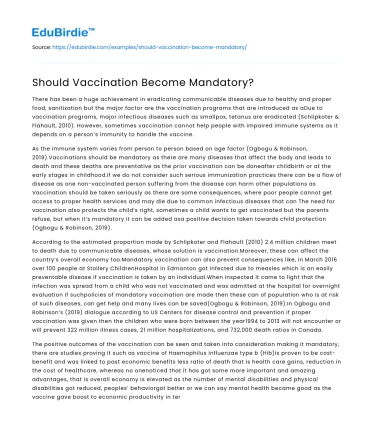Introduction
Vaccination has been heralded as a pivotal advancement in public health, significantly reducing the prevalence of infectious diseases and saving millions of lives. However, the debate about whether vaccination should be mandated by governments remains contentious. Proponents argue that mandatory vaccination is essential for achieving herd immunity and safeguarding public health, while opponents raise concerns about individual autonomy and potential adverse effects. This essay explores the complex arguments surrounding mandatory vaccination, examining the benefits of widespread immunization, the ethical implications, and the validity of opposing viewpoints. Through an analysis of scientific evidence, ethical considerations, and real-world examples, this paper aims to determine whether the benefits of compulsory vaccination outweigh the potential drawbacks.
Public Health Benefits of Mandatory Vaccination
The primary argument for mandatory vaccination policies lies in their capacity to protect public health and prevent outbreaks of vaccine-preventable diseases. Vaccines have been instrumental in eradicating or controlling diseases such as smallpox, polio, and measles (World Health Organization, 2020). Herd immunity, a crucial public health goal, requires a significant portion of the population to be vaccinated, thereby protecting those who cannot be vaccinated due to medical reasons. Mandatory vaccination ensures high coverage rates, contributing to community immunity and reducing the likelihood of disease transmission.
Save your time!
We can take care of your essay
- Proper editing and formatting
- Free revision, title page, and bibliography
- Flexible prices and money-back guarantee
An illustrative example is the dramatic decline in measles cases following the introduction of the measles vaccine. In the United States, widespread vaccination led to the declaration of measles elimination in 2000 (Centers for Disease Control and Prevention, 2011). However, recent resurgences in measles cases underscore the need for sustained high vaccination rates. In 2019, the U.S. experienced its highest number of measles cases in over two decades, largely due to unvaccinated individuals (CDC, 2019). This resurgence highlights the potential risks of declining vaccination rates and the critical role of mandatory policies in maintaining public health.
Furthermore, mandatory vaccination can alleviate the burden on healthcare systems by reducing the incidence of vaccine-preventable diseases. According to the World Health Organization, vaccines save an estimated 2-3 million lives annually and prevent countless hospitalizations (WHO, 2020). By minimizing the occurrence of outbreaks, mandatory vaccination policies can free up medical resources and reduce healthcare costs, benefiting society as a whole.
Ethical Considerations and Individual Autonomy
While the public health rationale for mandatory vaccination is compelling, ethical considerations must also be addressed. The imposition of vaccination raises questions about individual autonomy and informed consent. Critics argue that mandating vaccines infringes upon personal freedom and bodily autonomy, fundamental principles in medical ethics (Gostin, 2000).
To address these concerns, ethical frameworks such as the principle of proportionality can be applied. This principle suggests that public health interventions should be necessary, proportionate, and the least restrictive means available (Gostin & Wiley, 2016). In the case of vaccination, ensuring that mandates are imposed only when voluntary measures are insufficient to achieve herd immunity can help balance public health needs with individual rights.
Moreover, transparency and public engagement are crucial in addressing ethical concerns. Educating the public about the benefits and risks of vaccines, as well as addressing misinformation, can foster trust and encourage voluntary compliance. Real-life cases, such as the successful public health campaigns in Australia, demonstrate the effectiveness of combining mandates with education (Attwell & Navin, 2019). By prioritizing informed consent and respecting individual rights, mandatory vaccination policies can be ethically justified.
Addressing Counter-Arguments and Vaccine Safety
Opponents of mandatory vaccination often cite concerns about vaccine safety and adverse effects as reasons for resistance. It is essential to acknowledge these concerns and address them with scientific evidence. Vaccines undergo rigorous testing and monitoring to ensure their safety and efficacy (U.S. Food and Drug Administration, 2020). The risk of serious adverse effects is extremely low, and the benefits of vaccination far outweigh the potential risks (CDC, 2020).
Furthermore, the implementation of vaccine injury compensation programs in countries like the United States provides a mechanism for addressing rare adverse events, offering reassurance to the public (Institute of Medicine, 2012). These programs demonstrate a commitment to vaccine safety and accountability, reinforcing public confidence in vaccination.
Addressing misinformation and vaccine hesitancy is also crucial in countering opposition. Public health initiatives that provide transparent information and engage with communities can help dispel myths and build trust. For example, the use of social media campaigns and community outreach programs has proven effective in increasing vaccine acceptance (Dubé et al., 2015). By addressing safety concerns and promoting accurate information, mandatory vaccination policies can gain broader public support.
Conclusion
In conclusion, the question of whether vaccination should become mandatory involves a careful consideration of public health benefits, ethical considerations, and counter-arguments. While mandatory vaccination policies can significantly enhance public health by ensuring high coverage rates and preventing disease outbreaks, they must be implemented with respect for individual autonomy and informed consent. Ethical frameworks, transparency, and public engagement are essential in balancing public health needs with personal freedoms. By addressing vaccine safety concerns and countering misinformation, mandatory vaccination can be both an effective and ethically justifiable public health strategy. Ultimately, the decision to mandate vaccination should be guided by scientific evidence, ethical principles, and a commitment to safeguarding both individual rights and the health of the community.






 Stuck on your essay?
Stuck on your essay?

